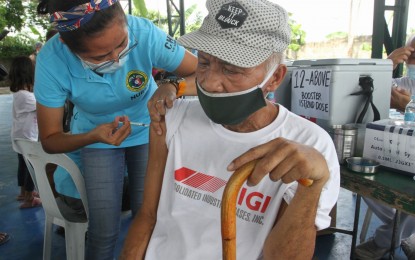
(PNA photo by Avito Dalan)
MANILA – An official of the Commission on Population and Development (POPCOM) on Wednesday called for more focus on the institutionalization of comprehensive health programs for senior citizens.
POPCOM officer-in-charge (OIC) Executive Director Lolito Tacardon said while there are existing long-term government programs for seniors in institutions or households, these interventions should be brought to the community level.
“There should be local programs for community-based rehabilitation to address elderlies’ disabilities,” he said in a news release.
For the programs to be effective, Tacardon said local government units should be more active in widening the scope of the health services for the elderly.
“We at POPCOM will work closely with legislators, local policymakers, and government leaders to create encompassing policies on health, socioeconomic, and others specifically targeted for our elderly,” he said.
Earlier, Prof. Grace Cruz of the University of the Philippines-Population Institute (UPPI) projected that the country is expected to become an “aging society” by the start of the next decade.
Cruz shared to PopCom former Executive Director Juan Antonio Perez that older persons would increase by 10 percent.
Perez, who attended a recent conference in Bangkok, Thailand in celebration of the International Day of Older Persons, said in a recent radio interview that among the country's senior citizens, the number of women is at 55 percent compared to men at 45 percent.
“While older Filipinas outlive their male counterparts, the former contend with diseases and disabilities. More than half (57 percent) struggle with their daily living and have mobility issues. About 56 percent of them are already widowed, while 70 percent of males are either still married or have partners, and are very much physically active,” he said.
POPCOM projects that about 11 percent of the total population will be 60 and older by 2030 outnumbering children 0 to 4 years old which is also expected to reverse the historical trend of the country having more children than older people.
According to the latest data released by the Philippine Statistics Authority, senior citizens now account for 8.5 percent of the country's population, or 9.2 million individuals. (PNA)
